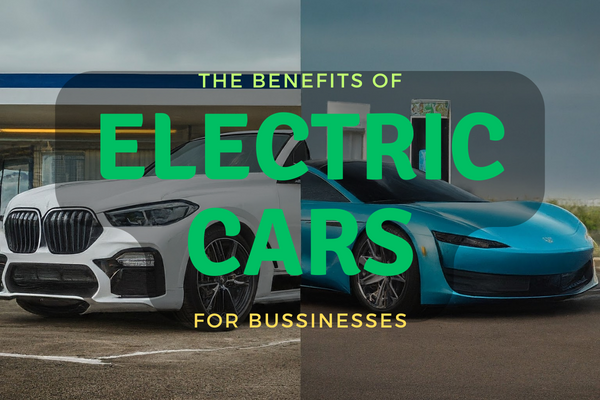Table of Contents
ToggleThe Benefits of Electric Cars for Businesses: Cost Savings and Environmental Impact
Electric cars have grown in popularity in recent years, both among individual consumers and organizations trying to optimize their transportation plans. In this comprehensive guide, we will look at why businesses are transitioning to electric fleets, as well as the tremendous cost savings and environmental benefits they provide.
Introduction to Electric Cars for Businesses
Electric vehicles (EVs) have emerged as a viable alternative to traditional gasoline and diesel-powered vehicles, providing various benefits to businesses, such as cheaper operating costs, decreased carbon emissions, and increased corporate social responsibility.
What are Electric Cars?
Electric cars, often known as EVs, are powered by electric motors and batteries rather than internal combustion engines. They have zero tailpipe emissions and are more energy efficient than traditional automobiles.
Why Businesses Are Switching to Electric Fleets
Businesses are increasingly turning to electric fleets for several reasons, including cost savings, environmental sustainability, and regulatory compliance. Let’s explore these benefits in detail.
Cost Savings with Electric Fleets
Lower Fuel Costs
One of the most significant advantages of electric vehicles for businesses is lower fuel costs. Electric cars have lower fueling costs compared to gasoline or diesel vehicles, resulting in substantial savings over the vehicle’s lifetime.
Reduced Maintenance Expenses
Electric cars have fewer moving components and need less maintenance than traditional combustion engine vehicles. Businesses can save greatly on maintenance expenses by using fewer oil changes, fewer mechanical components, and regenerative braking, which lowers brake pad wear.
Tax Incentives and Rebates
Many governments offer tax incentives, rebates, and grants to businesses that purchase electric vehicles, further reducing the total cost of ownership.
Environmental Impact of Electric Fleets
Reduced Carbon Emissions
Switching to electric fleets helps businesses reduce their carbon footprint by eliminating tailpipe emissions. This is particularly important for companies committed to sustainability and corporate social responsibility.
Air Quality Improvement
Electric vehicles produce zero tailpipe emissions, leading to improved air quality in urban areas and reducing the negative health effects associated with pollution.
Renewable Energy Integration
By charging electric vehicles with renewable energy sources such as solar or wind power, businesses can further reduce their environmental impact and contribute to the transition to a low-carbon economy.
Case Studies: Businesses Transitioning to Electric Fleets
Company A: Cost Savings Analysis
Company A, a delivery service, saved 30% on fuel costs and reduced maintenance expenses by 40% after switching to an electric fleet of delivery vans.
Company B: Environmental Impact Assessment
Company B, an engineering firm, reduced its carbon emissions by 50% and improved its corporate image by transitioning its company cars to electric vehicles.
Company C: Regulatory Compliance and Tax Incentives
Company C, a taxi service, took advantage of government tax incentives and rebates, resulting in significant savings on vehicle purchases and operational costs.
Is Electric Fleet Right for Your Business?
Considerations Before Switching
Before transitioning to electric fleets, businesses should consider factors such as upfront costs, charging infrastructure, range requirements, and potential tax incentives.
Assessing Total Cost of Ownership
Businesses should conduct a thorough analysis of the total cost of ownership, taking into account fuel savings, maintenance costs, tax incentives, and potential resale value.
Conclusion
Finally, electric cars provide numerous benefits to organizations, such as cost savings, environmental sustainability, and regulatory compliance. Businesses that migrate to electric fleets can save money, reduce their carbon impact, and contribute to a cleaner, greener future.
FAQs:
What are the benefits of electric vehicle industry?
The electric vehicle industry offers numerous benefits, including reduced greenhouse gas emissions, improved air quality, and decreased dependence on fossil fuels. Additionally, electric vehicles have lower operating costs and require less maintenance compared to traditional internal combustion engine vehicles.
How will electric vehicles affect businesses?
Electric vehicles can positively impact businesses by reducing operating costs through lower fuel and maintenance expenses. They also provide opportunities for companies to demonstrate corporate social responsibility and attract environmentally conscious customers. Moreover, businesses can benefit from government incentives and tax breaks for adopting electric fleets.
What are 5 advantages of electric vehicles?
- Lower Operating Costs: Electric vehicles have lower fuel and maintenance costs compared to gasoline-powered cars.
- Environmental Benefits: EVs produce zero tailpipe emissions, reducing air pollution and greenhouse gas emissions.
- Energy Efficiency: Electric motors are more efficient than internal combustion engines, converting more energy from the battery into motion.
- Quiet Operation: Electric vehicles operate quietly, contributing to reduced noise pollution in urban areas.
- Government Incentives: Many governments offer incentives such as tax credits and rebates to encourage the adoption of electric vehicles.
इलेक्ट्रिक वाहन उद्योग के क्या लाभ हैं?
इलेक्ट्रिक वाहन उद्योग कई लाभ प्रदान करता है, जैसे कि ग्रीनहाउस गैस उत्सर्जन को कम करना, वायु गुणवत्ता में सुधार करना, और इसके साथ ही फॉसिल ईंधन के प्रति आधारितता को कम करना। इसके अतिरिक्त, इलेक्ट्रिक वाहनों का ऑपरेटिंग खर्च कम होता है और उन्हें ट्रेडिशनल इंटरनल कंबस्टन इंजन वाहनों की तुलना में कम रखरखाव की आवश्यकता होती है।
Who benefits the most from electric cars?
The primary beneficiaries of electric cars are consumers and businesses looking to reduce their carbon footprint, save on fuel and maintenance costs, and contribute to environmental sustainability. Additionally, governments benefit from reduced air pollution and increased energy independence.
Why electric vehicles are important in the future?
Electric vehicles are essential for the future as they offer a sustainable solution to transportation, reducing reliance on fossil fuels and mitigating the impacts of climate change. They also contribute to improved air quality and public health in urban areas.
Will electric vehicles be successful?
Yes, electric vehicles have already shown significant success and are expected to continue growing in popularity. With advancements in technology, increasing infrastructure, and supportive government policies, electric vehicles are poised to become mainstream in the automotive industry.
Can an electric vehicle be a success in India?
Yes, electric vehicles have the potential to be successful in India, given the country’s commitment to reducing pollution and dependence on imported oil. However, challenges such as infrastructure development and affordability need to be addressed to accelerate their adoption.
How will EV affect the auto industry?
Electric vehicles will disrupt the auto industry by shifting the focus from internal combustion engine vehicles to electric propulsion systems. This transition will lead to changes in manufacturing processes, supply chains, and consumer preferences, with a greater emphasis on sustainability and innovation.
Why promote electric vehicles?
Promoting electric vehicles is crucial for reducing air pollution, mitigating climate change, and achieving energy independence. Additionally, electric vehicles offer economic benefits such as lower operating costs and job creation in the clean energy sector.
Why electric cars are more efficient?
Electric cars are more efficient because electric motors convert a higher percentage of energy from the battery into motion compared to internal combustion engines, which waste energy as heat. Additionally, regenerative braking allows electric vehicles to recapture energy during deceleration, further improving efficiency.
What is a good conclusion about electric vehicles?
In conclusion, electric vehicles offer numerous benefits, including lower operating costs, reduced emissions, and a more sustainable transportation option for the future. With ongoing advancements in technology and supportive policies, electric vehicles are poised to play a significant role in the transition to a cleaner, greener automotive industry.
Why are electric cars so powerful?
Electric cars are powerful because electric motors deliver instant torque, providing quick acceleration and responsive performance. Unlike internal combustion engines, which require time to build up power, electric motors deliver maximum torque from a standstill.
What are the benefits of EV policy?
The benefits of EV policies include reduced air pollution, decreased dependence on fossil fuels, job creation in the clean energy sector, and economic savings from lower fuel and maintenance costs. Additionally, EV policies contribute to global efforts to combat climate change and promote sustainable development.
Why do consumers prefer electric cars?
Consumers prefer electric cars for several reasons, including lower operating costs, environmental sustainability, and advanced technology features. Electric cars offer quieter operation, smoother acceleration, and the convenience of charging at home, making them attractive options for many drivers.
What is the biggest benefit of electric cars?
The biggest benefit of electric cars is their contribution to reducing greenhouse gas emissions and combating climate change. By eliminating tailpipe emissions and utilizing renewable energy sources, electric cars offer a cleaner and more sustainable mode of transportation.
What are some advantages of 100% electric cars?
Some advantages of 100% electric cars include zero tailpipe emissions, lower fuel and maintenance costs, instant torque for quick acceleration, and reduced noise pollution. Additionally, electric cars contribute to energy independence and improve air quality in urban areas.
What is the main advantage of electric vehicles?
The main advantage of electric vehicles is their environmental sustainability. Electric cars produce zero tailpipe emissions, reducing air pollution and greenhouse gas emissions, and helping to mitigate the impacts of climate change.
Why are electric cars the future?
Electric cars are the future because they offer a cleaner, more sustainable alternative to traditional gasoline-powered vehicles. With advancements in technology and infrastructure, electric vehicles are becoming increasingly practical and affordable for consumers worldwide.
What are the features of electric cars?
Electric cars feature electric motors, rechargeable batteries, regenerative braking systems, and advanced onboard electronics for monitoring energy usage and optimizing performance. They also offer various safety and convenience features, similar to traditional vehicles.
What is the impact of EV?
The impact of electric vehicles includes reduced air pollution, lower greenhouse gas emissions, decreased dependence on fossil fuels, and improved energy security. Additionally, EVs stimulate innovation and job creation in the clean energy sector.
Is an electric car good or bad?
Electric cars are generally considered good due to their environmental benefits, lower operating costs, and technological advancements. However, challenges such as range limitations and charging infrastructure still need to be addressed for wider adoption.
What is the basic concept of an electric vehicle?
The basic concept of an electric vehicle is to use electricity stored in a battery to power an electric motor, which drives the vehicle’s wheels. Unlike traditional internal combustion engine vehicles, electric cars produce zero tailpipe emissions and rely on rechargeable batteries for energy.
Can electric vehicles be a success in India?
Yes, electric vehicles can be successful in India, given the country’s growing concerns about pollution, rising fuel prices, and government initiatives to promote clean energy transportation. However, challenges such as infrastructure development and affordability need to be overcome for widespread adoption.
Why are electric cars more powerful?
Electric cars are more powerful because electric motors deliver instant torque, providing quick acceleration and responsive performance. Unlike gasoline engines, which require time to build up power, electric motors deliver maximum torque from a standstill.
What is the good point of an electric car?
One of the significant advantages of electric cars is their environmental friendliness. They produce zero tailpipe emissions, reducing air pollution and greenhouse gas emissions, and helping to combat climate change.
What are the benefits of an electric car essay?
The benefits of an electric car essay would include lower operating costs, reduced emissions, energy efficiency, and technological advancements. It would also discuss the environmental and economic benefits of electric vehicles and their role in shaping the future of transportation.
What are the benefits of e-power cars?
The benefits of e-power cars, or electric vehicles, include reduced fuel costs, lower maintenance expenses, and zero tailpipe emissions. Additionally, e-power cars contribute to energy independence and environmental sustainability.
Are electric cars more effective?
Yes, electric cars are more effective in several aspects compared to traditional gasoline-powered vehicles. They are more energy-efficient, produce fewer emissions, and have lower operating costs over their lifetime.
What are the four types of electric vehicles?
The four types of electric vehicles are battery electric vehicles (BEVs), plug-in hybrid electric vehicles (PHEVs), hybrid electric vehicles (HEVs), and fuel cell electric vehicles (FCEVs). Each type utilizes different powertrain technologies and energy sources.
Why should people buy an electric car?
People should buy electric cars for several reasons, including lower operating costs, reduced environmental impact, and technological advancements. Electric cars offer a cleaner, more sustainable transportation option for the future.
What motivates people to buy electric vehicles?
People are motivated to buy electric vehicles by factors such as cost savings, environmental concerns, technological innovation, and government incentives. Electric cars offer an attractive alternative to traditional gasoline-powered vehicles, with benefits that appeal to a wide range of consumers.
Who are EV buyers?
EV buyers include individuals, businesses, and government agencies looking to reduce their carbon footprint, save on fuel costs, and promote sustainability. They may be motivated by environmental concerns, financial incentives, or technological advancements.
What are the main customer benefits provided by an EV motor?
The main customer benefits provided by an EV motor include lower operating costs, reduced emissions, quieter operation, and smoother acceleration compared to traditional internal combustion engines. Electric motors also require less maintenance and offer a more responsive driving experience.
What is the promotion of electric vehicles?
The promotion of electric vehicles involves raising awareness about their benefits, providing incentives such as tax credits and rebates, expanding charging infrastructure, and implementing supportive policies to accelerate their adoption. Promoting electric vehicles helps reduce air pollution, combat climate change, and create a more sustainable transportation system.
What is the full form of EV?
EV stands for “Electric Vehicle,” which refers to a vehicle that runs on electricity stored in rechargeable batteries or other energy storage devices. Electric vehicles produce zero tailpipe emissions and offer a cleaner, more sustainable alternative to traditional gasoline-powered vehicles.
Read More:
The Impact of Autonomous Cars on the Future of Transportation: Explore how self-driving technology is reshaping the automotive industry.
The Future of Electric Cars: What to Expect in the Next Decade | 10 Facts
The Benefits of Car Leasing: Is it Right for You? 5 Advantages of leasing a car versus buying. ( Best Guide)
Car Maintenance Myths Debunked | 6 Myths You should Know













First Cars For Teens | Top Cars With Best Features (2024) Full Guide




What to do When Car Key Stuck In Ignition [Step-by-Step Guide]


611hbr
Hello there, just became aware of your blog through Google, and
found that it’s truly informative. I’m going to watch out for brussels.
I’ll appreciate if you continue this in future. Numerous
people will be benefited from your writing. Cheers!
Escape room
I was looking at some of your articles on this website and I believe this web site is very instructive!
Keep on putting up..